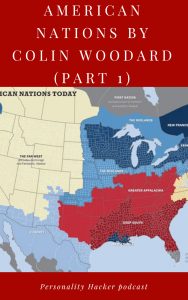Download Episode Here – right click link and select “Save Link As…”
In this episode, Joel and Antonia talk about the book American Nations by author Colin Woodard and how seeing North America through this lens could be another access point for healthy dialog.

To subscribe to the podcast, please use the links below:
Subscribe with iTunes
Non-iTunes Link
Download The Android App
Subscribe on Soundcloud
Subscribe with Stitcher
Subscribe on Google Play
Subscribe with Facebook Messenger
If you like the podcast and want to help us out in return, please leave an honest rating and review on iTunes by clicking here. It will help the show and its ranking in iTunes immensely! We would be eternally grateful!
Want to learn more?
Discover Your Personal Genius
We want to hear from you. Leave your comments below…


Share:
Podcast - Episode 0251 - Is Growing Your Copilot Even Worth It?
Podcast - Episode 0253 - American Nations by Colin Woodard (Part 2)
15 comments
I’m pure Midlander. My mom’s family is from eastern Pennsylvania and my dad’s is from north central Kansas. I relate more strongly to the Kansan expression of Midlander culture since I grew up here.
This is also helping me examine my family dynamics as suggested in the podcast. My mom is the granddaughter of German immigrants to Minnesota in the WWII era. This is technically Yankeedom but I don’t see much of that in her other than the value placed on education (she is one of 3 sisters who all were sent to college in the 1960s, seemingly due to their parents’ will rather than their own, and passed similar expectations down to their own offspring). She is definitely not politically progressive but as an enneagram 9 she seems to have aggressively absorbed my Dad’s Appalachian values. I’m just wondering now how relatively recent immigration fits into this model. I suppose immigrants choose the area they come to but they also weren’t part of the organic evolution of the region’s values. I’m inspired to learn more about my great grandparents and the circumstances of their immigration and their experience in Minnesota thereafter.
I’ve been percolating on this and it is connecting a lot of the perspectives I’ve experienced in my inner landscape and real time interactions with people. My latest Aha is different people’s approach to health care. Not in the Obama Care/Trump Care sense, but how people engage with providers and mainstream vs alternative vs cutting edge technological therapies etc. Also thinking about people’s perspectives on psychiatry and psychopharmacology, having either stigmatized views of it or openness to it or a tension around it. I haven’t cooked on it enough to have strong conclusions and I haven’t read the book yet, but I feel like Yankeedom has a strong influence in the evidence-based medicine that is the dominant aspect of mainstream medical training over the last 70 years or so, and also a stronghold of psychiatry and expectation that most people in the suburban upper-middle class does well to be in therapy and on prozac without stigma. I feel like Far West and Appalachia may be more prone to reject mental health intervention and even other mainstream medical intervention, avoiding the doctor’s office and preferring to take life on their own power as pioneers and settlers of mountain country have had to do for generations. Left Coast is both cutting edge tech and alternative medicine influenced it seems. Deep South probably prefers to go to every length to have thorough workup with the most established methods but that can be inappropriate use of resources (unnecessary tests like MRIs etc.). El Norte and First Nation more alternative and naturopathic/holistic influences most likely. Others I don’t have a clear enough beat on to comment about.
Anyway, this will definitely be on my mind as I interact with patients in the future here in LA where probably half of my patients have moved here from all other parts of the North America well into adulthood.
As a different slicing of the US populace along political lines, there was a details study on ‘political tribes’ in the US referred to by David Brooks recently (https://www.nytimes.com/2018/10/15/opinion/politics-race-white-tribalism.html).
The 160 page pdf report (https://hiddentribes.us/) clusters seven distinct tribes with the more extreme liberals and conservatives bracketing a majority that is less extreme. The extreme “wings” seem to dominate power structures, media airplay, and public political discourse will the middle is much less represented even though it is ~70%.
Might make an interesting podcast…
Interesting that your impression of Dallas was a more Midland flavor. Some of Texas falls in the Midlands, but north of Amarillo. That said, the impression I got from the book is that the Midlands is slowly taking over bordering areas. For example, Tidewater is declining and being consumed by the culture.
A